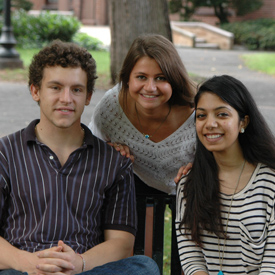Shalom/Salaam seeks to create campus unity through commonality

People would rather make friends than enemies.
Such is the simple – and profound – philosophy driving a fledgling organization at Rutgers that is attracting student activists on seemingly opposite sides of a conflict 6,000 miles away.
While Arab and Israeli world leaders argue long and loud at the United Nations this fall, a new student group on campus called Rutgers Shalom/Salaam is taking another, totally nonpolitical, tack.
“Tensions exist because people don’t know each other. We’re trying to build friendships here on campus, building on people’s similarities rather than on their differences,” says William Eastman, a senior in the School of Arts and Sciences majoring in political science and a founder of Rutgers Shalom/Salaam. “Our central goal is getting people together in a comfortable atmosphere and giving them a chance to get to know each other,.
Officially certified as a student organization in September, 2010, Shalom/Salaam invites Jew and Muslim – and other constituencies on Rutgers’ diverse New Brunswick Campus – to break bread together, literally and figuratively.
“I became involved with Shalom/Salaam because I am for bringing people together,” says Rida Hasan, a sophomore in SAS and a representative to the group from the Pakistani Students’ Organization. “There is so much we can learn from one another. The key is to have open communications.”
In addition to sponsoring a Family Dinner every semester – “If Christians, Jews and Muslims are descendants of Abraham, we are all family,” Eastman says – the group meets two Wednesdays a month in Hardenberg Hall on the College Avenue Campus.
Conversation might touch on recent or upcoming holidays – Ramadan and the Jewish fast of Tisha B’Av fall around the same time of year, for example – or the similarity of words such as “salaam” and “shalom” in the Arabic and Hebrew languages. The word means “peace.”
Wherever the discussion rambles, group leaders gently nudge it back on message.
“The commonalities between the Jews and Muslims on campus are many,” reflects Hasan. “We all are part of the Rutgers community, and presumably spend a lot of time here, so it can be said that we all have a lot more in common than we realize.”
On September 12, the organization held its semester kickoff, “An Evening with the Mayors of Teaneck” with Teaneck’s Muslim mayor, Mohammed Hameeduddin, and Orthodox Jewish deputy mayor, Adam Gussen. Both officials are Rutgers graduates. The two officials spoke of their work together in the Bergen County community, as well as the longstanding friendship that binds them across ethnic and religious lines.
Co-sponsored by Rutgers Hillel, the Rutgers Muslim Students Association, the Pakistani Students Association, and the Association of Indians at Rutgers University, the evening drew a crowd to the Student Activities Center, generating robust media coverage.
“We didn’t intentionally piggyback onto the 10th anniversary of 9/11; the date was set months in advance and we would not want to ever be insensitive to, or try to capitalize on, 9/11,” says Eastman, who noted that the hefty attendance mirrored the turnout at other Shalom/Salaam events, such as a comedy night last semester that attracted 300-plus people.
Money collected that evening went to Rutgers University Dance Marathon, which raises funds for children with cancer and blood disorders.
The Marlboro resident acknowledges that campuses are frequently hotbeds of ethnic dissent, and that the state university is no exception. “Given the huge Jewish population and the huge Muslim population here, some disagreement is inevitable,” Eastman says, but adds that other causes for acrimony are easy to identify.
“There’s as much tension around Republican and Democratic politics as there are around issues of the Middle East, for example,” Eastman says. “There will always be differing points of view, but we need to recognize that for the betterment of ourselves, our campus communities, and Rutgers at large, it’s more important to find common ground than draw lines in the sand and divide.”
Jane Vorkunova, a senior at Rutgers Business School–Newark and New Brunswick and a group founder, believes a key to the organization’s success is community service. Serving soup side by side at Elijah’s Kitchen in New Brunswick or distributing chocolates at the Monster Mash event on the Douglass Residential Campus breaks down barriers and builds common cause, she says.
“Tensions might be simmering under the surface, and that’s what we’re trying to combat,” adds Vorkunov.
Toby Jones, an assistant professor of history and the group’s faculty advisor, expresses admiration for its mission and its members.
“They are a remarkable group of young men and women who have set aside politics to pursue common understanding. They are brave, smart, and determined to do away with the prejudices and expectations that many tell them they are supposed to have,” says Jones.
Shalom/Salaam reflects a loose confederation of groups and individuals seeking to forge relations among traditionally hostile constituencies on campus.
In September, Rutgers’ student newspaper, The Daily Targum, ran a letter in which Muslim Student Association president Ibaad Sadiq and Rutgers Hillel President Zeke Pariser vowed to collaborate in creating an atmosphere of understanding and tolerance on campus.
“We are committed to fostering a culture of not only respect between students of different faiths, but one also conducive to the development of symbiotic relationships that produce learning, new perspectives, and friendships,” the students wrote.
And on October 17, the Allen and Joan Bildner Center for the Study of Jewish Life and the Center for Middle Eastern Studies will cosponsor a panel discussion, "Going Viral: Anti-Semitism, Islamophobia and the Role of the Media.”
To reach Rutgers Shalom/Salaam, email: rutgersshalomsalaam@gmail.com or search “Rutgers Shalom/Salaam” on Facebook.